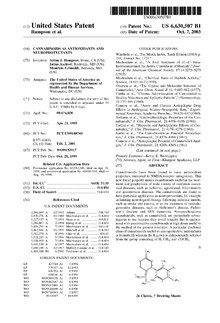KannaLife
 | |
| Company type | Private (Subsidiary) |
|---|---|
| Industry | Pharmaceutical |
| Founded | 2010 |
| Founders | Dean Petkanas, Thoma Kikis |
| Headquarters | Doylestown, Pennsylvania |
| Total assets | Exclusive License of patent US 6630507 |
| Website | http://kannalife.com |

Kannalife Sciences Inc. , a subsidiary of Neuropathix, Inc., is a bio-pharmaceutical and phyto-medical company based in Doylestown, Pennsylvania founded by Dean Petkanas and Thoma Kikis.[1] Kannalife was formed in 2010 and is involved in the research and development of novel new therapeutic agents designed to reduce oxidative stress, and act as immuno-modulators and neuroprotectants.[2]
In 2011, the company was granted an Exclusive License[3] by National Institutes of Health – Office of Technology Transfer (NIH-OTT) for the Commercialization of patent US 6630507, “Cannabinoids as Antioxidants and Neuroprotectants."[4]
In 2021, Kannalife, was awarded a non-dilutive three-year $2.97 Million grant from the National Institute of Neurological Disorders and Stroke (NINDS) and National Institutes of Health (NIH).[5] The three-year study grant is funded through the NIH HEAL Initiative (Helping End Addiction Long-term) for enhanced pain management and provides funding specifically in the Development of KLS-13019 for Neuropathic Pain.[6] In 2024, The Michael J. Fox Foundation awarded Kannalife a $1.49 Million grant to support the development of KLS-13019 as a potential treatment for Parkinson's disease. This funding aims to advance preclinical research into KLS-13019, a therapeutic targeting neuroinflammation and mitochondrial dysfunction associated with Parkinson's disease. [7]
Kannalife is currently conducting research and development at the Pennsylvania Biotechnology Center of Bucks County to treat Chemotherapy-induced peripheral neuropathy, Hepatic encephalopathy, Parkinson's disease, Mild Traumatic Brain Injury and CTE.
Kannalife was featured in Sports Illustrated article on using cannabinoids to treat Concussions and CTE. [8]
References
[edit]- ^ Guion, Payton (November 12, 2014). "The NFL's Anti-Weed Policy Even Extends to Drugs That Could Prevent Brain Damage". VICE News. Archived from the original on May 8, 2015. Retrieved 2014-12-12.
- ^ Leland, John (October 31, 2014). "For Pot Inc., the Rush to Cash In Is Underway". The New York Times. Retrieved 2014-10-31.
- ^ "Prospective Grant of Exclusive License: Development of Cannabinoid(s) and Cannabidiol(s) Based Therapeutics To Treat Hepatic Encephalopathy in Humans". federalregister.gov. Retrieved 2011-11-17.
- ^ "Kannalife Sciences, Inc. Signs Exclusive License Agreement With National Institutes Of Health Office Of Technology Transfer (NIH-OTT)". thestreet.com. Retrieved 2012-07-09.
- ^ "Neuropathix, Inc. Wholly Owned Subsidiary Kannalife Sciences, Inc. Awarded $2.97 Million Phase 2 Study Grant from National Institute of Neurological Disorders and Stroke (NINDS)". Biospace. 28 September 2021. Retrieved 2021-09-28.
- ^ "Development of KLS-13019 for Neuropathic Pain". reporter.nih.gov. Retrieved 2021-09-28.
- ^ Lobo, Andrea (July 1, 2024). "MJFF $1.49M grant to advance preclinical research into KLS-13019". Parkinson's News Today. Retrieved 2024-07-01.
- ^ "How cannabis is helping one company research treatment of CTE". Sports Illustrated. July 12, 2016.
